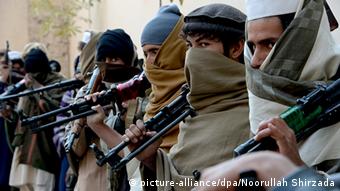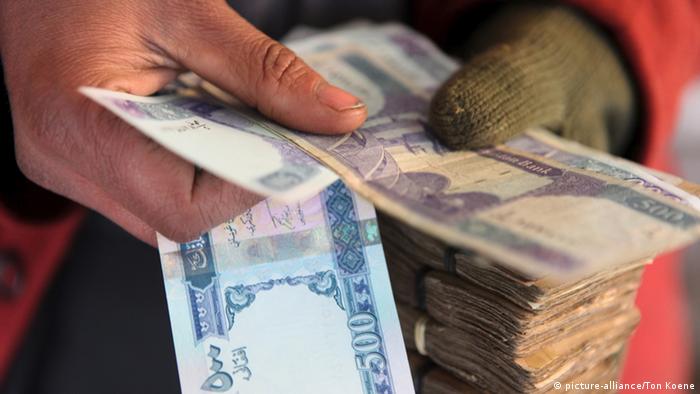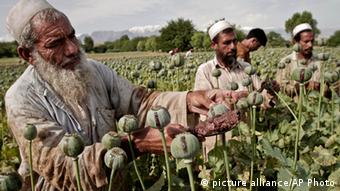How the Taliban get their money
Extortion, drug trafficking, foreign donations - DW examines how the Afghan Taliban have managed to finance a 15-year-long insurgency, and why their illicit sources of income have been so hard to target.
At a secret meeting last month near the Pakistani city of Quetta, the Taliban demanded a hefty new "protection tax" from Afghan telecom companies, according to news agency AFP.
The extortion demand - reportedly made to representatives of four unspecified cellular companies in exchange for not damaging their sites or harming their employees - shows first and foremost the militant group's determination to tap into one of Afghanistan's few lucrative sectors in times of sluggish growth.
But more broadly, the move may also reflect the insurgents' attempt to further diversify their income sources ahead of potential peace talks with Kabul. "The latest demand reflects growing intent within the Taliban leadership for the group to transition away from being simply an insurgent group towards forming an organized parallel government," said Omar Hamid, head of Asia Pacific Country Risk at global analytics firm IHS.
"Further indicators of this would include a more publicized engagement of civil society, and the establishment of parallel institutions," he added."
Telecom companies have paid protection money to the Taliban in the past, but reports indicate the group wants to tax the telecom sector by 10 percent just like any other business in the areas under their control," Wahid Mazhdah, a former employee of the ousted Taliban regime, told DW.
From kidnappings to drug money
But just how diverse are these income sources? Many view the Taliban as experts in managing illicit industries given that they have derived revenue from all sorts of illegal pursuits, ranging from kidnapping and smuggling goods to extortion, and especially drug trafficking.
For instance, the insurgents depend on farmers - mostly located in the southern provinces of Helmand, Uruzgan, Kandahar and Zabul - to grow opium poppies, while offering these farmers a handsome financial reward for doing so. The sums paid are usually much higher than what they would make through alternate livelihood programs developed by the international community meant to combat Afghanistan's illicit drug trade.
The Taliban also use threats and violence to ensure that farmers grow their crops. They profit not only from drug sales, but also by extracting revenue from various taxes imposed on drugs throughout key trade routes, many of which are located in areas under their control.
And what happens to those who fail to pay? "I know farmers who were too poor to pay Taliban taxes or simply did not want to pay the group. They were taken from their homes and no one knows where they are now," a resident of Helmand province told DW on the condition of anonymity.
The militants also cooperate with drug traffickers, seeking revenue and shelter in exchange for offering protection to drug convoys. "The Taliban receive large sums of money from drug traffickers because the group protects drug markets, escorts traffickers and helps them transport the opium," said the Helmand resident.
It is hard to say just how much money the group makes off the narcotics trade. But according to counter-terrorism expert Tomas Olivier, the estimates range between $100 million and $300 million a year. The South Asian nation produces some 80 percent of the world's opium, which is used in the production of heroin.
Extortion and 'taxation'
The Taliban extort money not only from farmers and telecom companies. A significant additional source of revenue comes from the taxation of the general population in their areas of control, and is generally carried out under the auspices of religious taxes. A UN report published in early September 2012 revealed that, where they can, the Taliban raise two forms of traditional taxation, namely, ushr, a 10 percent tax on harvest, and zakat, a 2.5 percent tax on wealth.
"As the main economic activity in areas under Taliban control is farming, much of it poppy cultivation, ushr is the main source of their income; but the Taliban will also tax services, such as water or electricity, although they have no influence over their supply," the UN said.
The militants will also take payments for dispensing justice, though not generally bribes, and levy fines, the report stated, adding that in some areas they collect a 10 percent tax from local shopkeepers and other small businesses. "In other words, at the local level, the Taliban act in a way familiar to most administrations."
Experts also believe that, at some point, contractors, non-governmental organizations, private companies and even members of the Afghan government have been either directly or indirectly involved in some kind of Taliban extortion or money protection scheme in order to facilitate their own goals in certain parts of the conflict-ridden country.
"Few would want to admit that they provide such money to the Taliban, so the figures are elusive. But there is even reason to believe that when international combat forces were in Afghanistan, protection money was paid to the Taliban to allow supply convoys to move about the country," Michael Kugelman, a South Asia expert at the Washington-based Woodrow Wilson Center, told DW.
More broadly, adds analyst Hamid, the risk of extortion in Afghanistan is likely to increase in 2016, as the Taliban's traditional sources of funding have tightened. According to the United Nations Office on Drugs and Crime, potential opium production from poppy cultivation in Afghanistan decreased by 48 percent in 2015, while foreign funding has also been limited as regional powers are pushing for the group to enter into peace talks with the Kabul government.
Foreign support
But that's not all. The group is also believed to receive financial contributions from Islamic charities and other institutions from outside Afghanistan. These tend to come from countries in the Persian Gulf region and neighboring Pakistan.
"Certainly there is money coming from abroad," says Kugelman. Much of it, he points out, comes from countries of the Persian Gulf, particularly Gulf Cooperation Council nations such as Saudi Arabia, Kuwait, the United Arab Emirates. "That said, with oil revenues down in recent months, these monies may have been reduced. Still, we can assume that Muslim charities from this region and perhaps other parts of the Muslim world are sending financial contributions to the Taliban."
Some say that another reason for the Taliban's resilience lies in the financial and logistical support they reportedly get from neighboring Pakistan. "I would argue that there is a close connection between the Pakistani intelligence agency ISI and the Afghan Taliban which has been apparent since the Soviet invasion in 1979," counter-terrorism expert Tomas Olivier told DW.
However, he stressed, there has never been any explicit evidence, and the Pakistani government has repeatedly denied the allegations.
Hundreds of millions in revenue
It's hard to say just how high the Taliban's annual budget is, but many put it at several hundred millions of US dollars. The 2012 UN report estimated that in the period April 2011 to March 2012 the Taliban raised $400 million through a combination of taxes, donations, extortion, and involvement in the illegal narcotics industry.

The Taliban are believed to receive financial contributions from Islamic charities and other institutions from outside Afghanistan
The report also highlighted that the Taliban generated substantial revenue through the extortion of aid and development programs funded by foreign governments and the ISAF mission. "Estimates of Taliban income from contracts funded by the United States and other overseas donors range from 10 to 20 percent of the total, usually by the Taliban agreeing protection money with the contractor or demanding a cut," said the UN report.
In any case, the Taliban leadership seems to be able to get their hands on enough money to give their fighters an attractive salary. "Many of the foot soldiers have been drawn to the group not because of its ideology, but because of its paychecks. In a poor country like Afghanistan, desperate young people will gladly accept a generous and consistent paycheck from an entity that has the money to provide one - even if that entity is a terror group," said Kugelman.
"These vast revenues help explain why the Taliban have remained such a ferocious insurgency despite the infighting, leadership crises, and losses they have suffered on the battlefield," said Kugelman.
Moreover, the group enjoys the support of some sections of Afghan society, meaning they don't always require vast amounts of money to survive. "They control parts of the population, the terrain and the traditional economic systems, routes and markets," said Olivier, who is also CEO of security consultancy Lowlands Solutions Netherlands (LSN).
Experts believe local support, which is also gained through intimidation and physical force, has become crucial to the Taliban's strategy, in particular because the Kabul government is not perceived as legitimate by many locals.
Difficult to track
But why has it been so difficult to target these income sources? One reason for this is that the Taliban seem to do such a good job of diversifying their revenue sources that "even if you tackle one, others will remain strong," say experts.
It's a financial system which analyst Olivier describes as a "layered model" made up of a combination of drug money, (ideological) individual sponsoring, and protection and extortion money which they "tax" on the local population, contractors and other assets in Taliban-controlled areas.
Moreover, given that most of these funding sources are illegal, they are not part of the regular financial system, thus making them very difficult to track.
"There is not much information available on the Taliban's foreign income sources given that they don't use modern financial tools such as banks. The group receives the money in cash via couriers or through traditional money-transferring systems," said former Taliban employee Mazhdah. On top of that, cash movement in and out of Afghanistan is subject to few restrictions.
Last but not least, there is the issue of corruption - believed to be rampant in Afghanistan - which enhances a system in which money can flow freely, thus undercutting policies meant to undercut the group's funding sources.
Additional reporting by Masood Saifullah.S




No comments:
Post a Comment